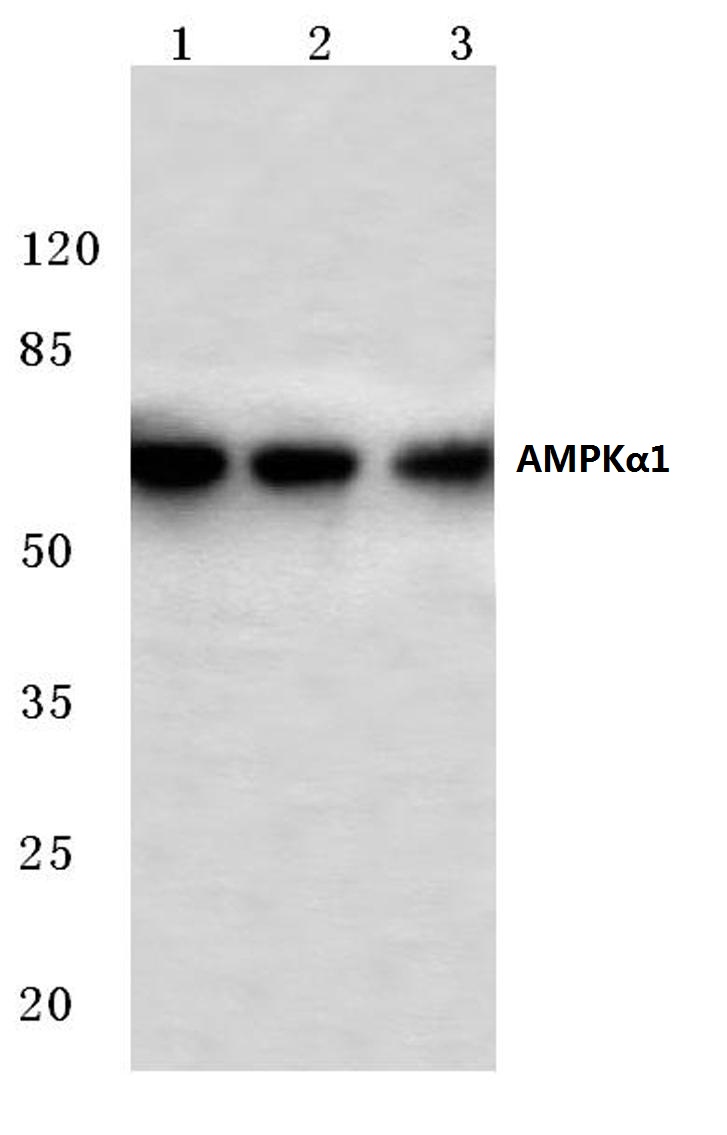AMPK alpha 1 (PRKAA1) Rabbit Polyclonal Antibody
Other products for "PRKAA1"
Specifications
| Product Data | |
| Applications | ELISA, IF, IHC, WB |
| Recommended Dilution | Western blot: 1/500-1/1000. Immunohistochemistry on Paraffin sections: 1/50-1/200. Immunofluorescence: 1/50-1/200. |
| Reactivities | Human, Mouse, Rat |
| Host | Rabbit |
| Clonality | Polyclonal |
| Immunogen | Synthetic peptide, corresponding to amino acids 450-500 of Human AMPKα1. |
| Specificity | This antibody detects endogenous levels of PRKAA1 / AMPK1 protein. (region surrounding Thr479) |
| Formulation | Phosphate buffered saline (PBS), pH 7.2 State: Aff - Purified State: Liquid purified Ig fraction Preservative: 0.05% Sodium azide |
| Concentration | 1.0 mg/ml |
| Purification | Affinity chromatography using epitope-specific immunogen and the purity is > 95% (by SDS-PAGE) |
| Storage | Store undiluted at 2-8°C for one month or (in aliquots) at -20°C for longer. |
| Stability | Shelf life: one year from despatch. |
| Predicted Protein Size | ~ 63 kDa |
| Gene Name | Homo sapiens protein kinase AMP-activated catalytic subunit alpha 1 (PRKAA1), transcript variant 1 |
| Database Link | |
| Background | AMPK is a heterotrimeric complex comprising a catalytic α subunit and regulatory β and γ subunits. It protects cells from stresses that cause ATP depletion by switching off ATP-consuming biosynthetic pathways. AMPK is activated by high AMP and low ATP through a mechanism involving allosteric regulation, promotion of phosphorylation by an upstream protein kinase known as AMPK kinase, and inhibition of dephosphorylation. Activated AMPK can phosphorylate and regulate in vivo hydroxymethylglutaryl-CoA reductase and acetyl-CoA carboxylase, which are key regulatory enzymes of sterol synthesis and fatty acid synthesis, respectively. The human AMPKα1 and AMPKα2 genes encode 548 amino acid and 552 amino acid proteins, respectively. Human AMPKβ1 encodes a 271 amino acid protein and human AMPKβ2 encodes a 272 amino acid protein. The human AMPKγ1 gene encodes a 331 amino acid protein. Human AMPKγ2 and AMPKγ3, which are 569 and 492 amino acid proteins, respectively, contain unique N-terminal domains and may participate directly in the binding of AMP within the AMPK complex. |
| Synonyms | AMPK1, AMPK alpha-1 chain |
| Reference Data | |
| Protein Families | Druggable Genome, Protein Kinase |
| Protein Pathways | Adipocytokine signaling pathway, Hypertrophic cardiomyopathy (HCM), Insulin signaling pathway, mTOR signaling pathway, Regulation of autophagy |
Documents
| Product Manuals |
| FAQs |
{0} Product Review(s)
0 Product Review(s)
Submit review
Be the first one to submit a review
Product Citations
*Delivery time may vary from web posted schedule. Occasional delays may occur due to unforeseen
complexities in the preparation of your product. International customers may expect an additional 1-2 weeks
in shipping.






























































































































































































































































 Germany
Germany
 Japan
Japan
 United Kingdom
United Kingdom
 China
China




